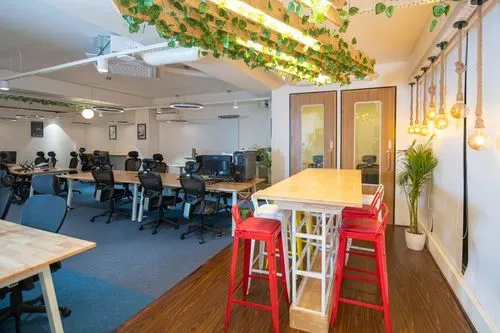Why Consider Commercial Real Estate Investment?
March 15, 2024
Introduction to Commercial Real Estate Investment
Thinking about dipping your toes into the investment world? Let's talk about commercial real estate (CRE) - a choice that's been catching a lot of eyes lately. CRE involves properties used for business purposes, like offices, malls, and warehouses. Unlike buying a house or apartment to live in or rent out, investing in CRE means you're stepping into the business side of things.
Why is CRE getting so much attention? For starters, it's known for bringing in steady cash flow. Imagine owning a building where businesses pay you rent. That's a pretty solid way to make money, right? Plus, as cities grow and businesses expand, the demand for commercial spaces rises. This means your investment has a good chance of growing in value over time.
But here's the kicker: CRE isn't just about making money. It's also about diversification. Adding CRE to your investment mix can spread out your risks and potentially boost your overall returns. So, if you're looking for a way to invest that goes beyond stocks and bonds, commercial real estate might just be the ticket. Let's dive deeper into why CRE is becoming a go-to investment choice for many.
What Makes Commercial Real Estate Appealing?

So, what's the big deal about commercial real estate (CRE)? Well, it's got a few tricks up its sleeve that make it stand out. For one, it's like having a golden goose. You invest, and it keeps giving back in ways that other investments might not. Let's break it down a bit more.
First off, CRE is pretty solid. While the stock market can be like a roller coaster, commercial properties tend to stand their ground. They're like the steady, reliable friend who's always there for you. This stability is a big plus for investors looking for something they can count on.
Then there's the appreciation aspect. Over time, commercial properties can increase in value. This isn't just about the buildings themselves getting more valuable. It's also about the land they're on becoming more sought after. As neighbourhoods grow and develop, your investment could become the next hot spot.
And let's not forget about the income. Renting out commercial space means you could have a steady stream of income. This isn't just any income, though. It's often higher than what you'd get from residential rentals. So, in the world of investing, CRE is kind of like hitting two birds with one stone: you get stability and the potential for growth. Not too shabby, right?
Why Invest in Commercial Real Estate?

Why put your money into commercial real estate, you ask? Let's dive into the reasons that make it a smart move.
First up, the profit game. Commercial properties can be real moneymakers. We're talking about spaces businesses rent, which means they're willing to pay a premium for the perfect spot. This can lead to a pretty attractive return on investment (ROI). Imagine owning a building in a bustling area. The businesses that rent from you not only pay rent but also tend to stick around longer, ensuring a steady flow of income.
Now, about that ROI. When we compare commercial real estate to residential, things get interesting. Sure, renting out a house or apartment can bring in good money. But commercial properties? They often take the cake. The reason is simple: businesses generally pay more for rent, and leases are longer. This means you're looking at a more consistent and often higher income over time.
But let's not sugarcoat it. With higher rewards come higher risks. Commercial real estate can be complex. Market trends, economic shifts, and the financial health of your tenants can all impact your investment. Plus, these properties often require a bigger upfront investment than residential ones.
However, here's the kicker: while the risks are there, the rewards can be significant. With the right location, a solid tenant, and a bit of savvy, commercial real estate can offer stability and growth potential that's hard to beat. So, weighing the risks against the rewards, many investors find commercial real estate to be a compelling choice.
The Financial Benefits of Commercial Real Estate Investment

Diving into the financial perks of commercial real estate (CRE), there's a lot to like. Let's break it down.
First off, we've got steady cash flow and high rental yields. Imagine owning a building where businesses lease space. These aren't just any tenants; they're businesses, from cafes to boutiques, all paying rent. This rent rolls in like clockwork every month, filling your pockets. For example, owning a small strip mall with a coffee shop, a boutique, and a salon could mean a consistent stream of income from diverse sources. This diversity helps cushion you against the ups and downs of the market.
Now, let's talk about the tax perks and how CRE can be a shield against inflation. The government likes to encourage property investment, so they offer tax deductions on mortgage interest, property taxes, and even some costs involved in running and improving your property. These deductions can significantly lower your tax bill.
As for inflation, while most things get more expensive, so does rent. This means your income from CRE can increase over time, helping you keep pace with the cost of living. It's like having a built-in protection against the money's buying power decreasing over time. So, while your dollars might buy less bread or gas, the rent you collect can increase, balancing things out.
Understanding the Market: The Key to Successful Investment

Getting the hang of the market is crucial for nailing your investment in commercial real estate (CRE). It's all about three big things: location, market trends, and economic indicators.
- Location is king. A spot in a bustling area can mean more businesses wanting to rent your space. Think about it: a shop in a busy downtown street versus one hidden away in a quiet corner. The first one's likely to get more foot traffic, right?
- Then, there are market trends. Keeping an eye on what's hot and what's not helps you stay ahead. If remote work is on the rise, office spaces might see less demand. Knowing this can guide your investment choices.
- Economic indicators are your compass. They show you where the economy's heading. High employment rates? People have money to spend, which is good news for retail spaces.
But here's the deal: none of this matters if you don't do your homework. Due diligence and market research are your best friends. They help you understand the nitty-gritty of your investment. Skipping this step is like sailing without a map. So, dive deep into the details before you take the plunge. It's the smart way to invest.
Challenges in Commercial Real Estate Investment

Investing in commercial real estate (CRE) isn't all smooth sailing. Here are a few bumps you might hit along the way and how to navigate them:
- High Initial Investment: CRE often comes with a hefty price tag. But, pooling resources through partnerships or real estate investment trusts (REITs) can make it more accessible.
- Complexity: Leases, zoning laws, and property management can be a maze. Hiring experts like property managers or real estate attorneys can help you steer clear of pitfalls.
- Market Fluctuations: The market can be unpredictable, impacting property values and demand. Diversifying your investments and staying informed can help buffer against market swings.
- Tenant Vacancies: Empty spaces mean lost income. Keeping your property well-maintained and competitively priced can attract and retain tenants.
Facing these challenges head-on with smart strategies can turn potential obstacles into stepping stones towards your investment success.
Takeaway
As we wrap up our exploration of commercial real estate (CRE) investment, it's clear that this path offers a unique blend of opportunities and challenges. The allure of CRE lies in its potential for steady cash flow, appreciation, and the ability to hedge against inflation, making it a compelling option for those looking to diversify their investment portfolios. The stability and higher income potential compared to residential real estate are attractive, but they come with the need for a deeper understanding of the market and a readiness to navigate its complexities.
Understanding the market is key to unlocking the full potential of CRE investment. Location, market trends, and economic indicators play critical roles in determining the success of your investment. Doing your homework, conducting thorough market research, and possibly enlisting the help of professionals can provide the insights needed to make informed decisions. This proactive approach can help mitigate risks associated with market fluctuations, tenant vacancies, and the inherent complexities of commercial leases and property management.
In the landscape of commercial real estate investment, adding premium managed office space to your portfolio stands out as a strategic move. With the evolving dynamics of the workplace, the demand for flexible, well-managed office environments is on the rise.
Investing in such spaces, like those offered by Urban Vault, not only diversifies your investment portfolio but also taps into the future of work. Urban Vault's premium managed office spaces represent an opportunity to be at the forefront of this shift, making it a smart addition to any real estate investment strategy.
Frequently Asked Questions (FAQs)
Q1. What makes commercial real estate a stable investment?
A1. Commercial real estate offers stability through long-term leases and the potential for steady income, making it less volatile than other investment types.
Q2. How can location affect my commercial property's ROI?
A2. A prime location in a high-demand area can significantly increase rental yields and property value, enhancing your investment's ROI.
Q3. What are the key strategies for maximising commercial real estate investment returns?
A3. Strategic tenant selection, property improvements, and leveraging market cycles are crucial for enhancing returns on commercial real estate investments.
Q4. Can commercial real estate investment hedge against inflation?
A4. Yes, commercial properties often see rent increases and property value appreciation that can outpace inflation, providing a protective hedge.
Q5. Why is due diligence important in commercial real estate investment?
A5. Due diligence uncovers potential risks and ensures the property meets your investment criteria, safeguarding your financial interests.
FAQ
What types of office spaces does Urban Vault offer?
Is Urban Vault suitable for startups and freelancers?
Is there professional support available at Urban Vault's managed office spaces?
Can I customize my office space at Urban Vault?
What is the per seat cost at Urban Vault?

.webp)
.webp)




.webp)



